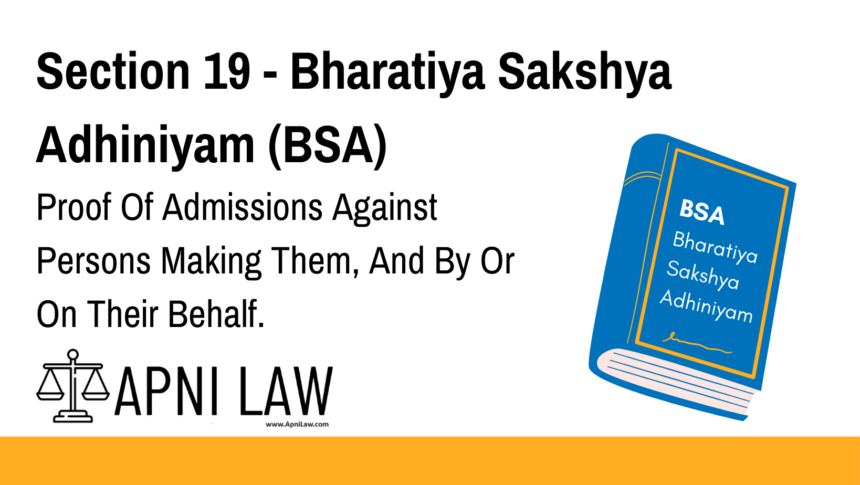Code
Admissions are relevant and may be proved as against the person who makes
them, or his representative in interest; but they cannot be proved by or on behalf of the
person who makes them or by his representative in interest, except in the following cases,
namely:—
(1) an admission may be proved by or on behalf of the person making it, when
it is of such a nature that, if the person making it were dead, it would be relevant as
between third persons under section 26;
(2) an admission may be proved by or on behalf of the person making it, when
it consists of a statement of the existence of any state of mind or body, relevant or in
issue, made at or about the time when such state of mind or body existed, and is
accompanied by conduct rendering its falsehood improbable;
(3) an admission may be proved by or on behalf of the person making it, if it is
relevant otherwise than as an admission.
Illustrations.
(a) The question between A and B is, whether a certain deed is or is not forged. A
affirms that it is genuine, B that it is forged. A may prove a statement by B that the deed is
genuine, and B may prove a statement by A that deed is forged; but A cannot prove a
statement by himself that the deed is genuine, nor can B prove a statement by himself that
the deed is forged.
(b) A, the captain of a ship, is tried for casting her away. Evidence is given to show
that the ship was taken out of her proper course. A produces a book kept by him in the
ordinary course of his business showing observations alleged to have been taken by him
from day to day, and indicating that the ship was not taken out of her proper course. A may
prove these statements, because they would be admissible between third parties, if he were
dead, under clause (b) of section 26.
(c) A is accused of a crime committed by him at Kolkata. He produces a letter written
by himself and dated at Chennai on that day, and bearing the Chennai post-mark of that day.
The statement in the date of the letter is admissible, because, if A were dead, it would be
admissible under clause (b) of section 26.
(d) A is accused of receiving stolen goods knowing them to be stolen. He offers to
prove that he refused to sell them below their value. A may prove these statements, though
they are admissions, because they are explanatory of conduct influenced by facts in issue.
(e) A is accused of fraudulently having in his possession counterfeit currency which
he knew to be counterfeit. He offers to prove that he asked a skilful person to examine the
currency as he doubted whether it was counterfeit or not, and that person did examine it
and told him it was genuine. A may prove these facts.
Explanation
This section discusses the circumstances in which admissions made by a person can be proven or used against them. Generally, an admission is a statement that suggests an inference about a fact in issue. However, the person who makes the admission cannot usually prove it in their favor unless certain conditions apply.
These conditions include:
- If the person is dead: An admission could be used if the person who made it is no longer alive (Section 26).
- State of mind or body: If the admission relates to the state of mind or body at the time it was made and is accompanied by conduct making the admission less likely to be false.
- Relevance otherwise: If the admission is relevant for reasons other than being an admission (e.g., explaining conduct).
Illustrations
- Forgery of a Deed
- A says the deed is genuine; B says it’s forged.
- A can’t prove by his own statement that the deed is genuine. B can’t prove by his own statement that the deed is forged.
- However, A can prove B’s statement that the deed is genuine, and B can prove A’s statement that it is forged.
- Ship’s Course
- A, the captain of a ship, is tried for casting it away. He offers a logbook he kept, showing that the ship was not taken out of course.
- A may prove the statements in the logbook as they would be admissible between third parties if A were dead (Section 26).
- Letter Date and Location
- A is accused of committing a crime in Kolkata but has a letter dated in Chennai on the same day.
- The date and location of the letter are admissible as it would be admissible under Section 26 if A were dead.
- Explanation of Conduct
- A, accused of receiving stolen goods, offers to prove he refused to sell them below their value.
- These statements may be admitted because they explain conduct in relation to the issue.
- Doubt over Counterfeit Currency
- A, accused of having counterfeit currency, offers to prove he had it examined by an expert because he doubted it was counterfeit.
- These statements are admissible because they help explain A’s actions regarding the issue at hand.
Key Concepts
- Admissions generally cannot be proven by the person who made them or their representative.
- However, there are exceptions where such admissions can be admitted into evidence.
- Statements regarding someone’s state of mind, or evidence of a person’s conduct in relation to a fact in issue, may be used as admissions in certain situations.













